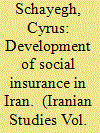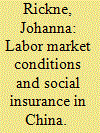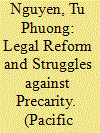|
|
|
Sort Order |
|
|
|
Items / Page
|
|
|
|
|
|
|
| Srl | Item |
| 1 |
ID:
187811


|
|
|
|
|
| Summary/Abstract |
This study examines the causal effects of having a Chinese Communist Party (CCP) branch on the coverage of labour contracts and social insurance among employees in private enterprises. Using a regression discontinuity design in a quasi-experimental framework, we find that having a Party branch has a significant effect on the coverage rates of individual and collective labour contracts as well as five social insurance schemes. The positive effect of having a Party branch on contract and social insurance coverage are weaker when the enterprise also has a trade union and staff representative congress, when the entrepreneur is a member of the CCP or the People's Congress or Political Consultative Conference and in provinces in which government intervention is lower or the private sector more developed. We find that firm-level mean wages and spending on training and occupational health and safety mediate the relationship between having a Party branch and labour rights.
|
|
|
|
|
|
|
|
|
|
|
|
|
|
|
|
| 2 |
ID:
075609


|
|
|
|
|
| Publication |
2006.
|
| Summary/Abstract |
This text brings the case of Iranian social insurance (SI) to bear on the processes shaping Iranian politics from 1941 to 1960. It holds that the political needs of upper class rule (1941-51) and of the early autocratic regime (1953-1960) helped to shape SI's nature, extent, and limits. A key objective was to propagandistically use a minimal version of SI to try undermining communist and workers' trade unionist agitation. Iranian SI had two rationales. Although a few workers demanded SI measures during the Constitutional Revolution, the first SI program (1922, 1931, 1933) covered government employees, i.e. was a function of state-building. This paper focuses on a second program, targeting non-government workers. Starting in 1936 (1943, 1949), it was meant to tackle the social and political challenges posed by a nascent industrial working class. However, throughout the 1940s, workers' SI laws remained a dead letter, and the first integrated SI bureaucracy (1953), although ensuring 180,000 people, was in reality quite inefficient.
|
|
|
|
|
|
|
|
|
|
|
|
|
|
|
|
| 3 |
ID:
103306


|
|
|
|
|
| Publication |
2011.
|
| Summary/Abstract |
Developing countries vary dramatically in the amount they spend on social insurance. We establish a theoretical framework linking autarkic post-World War II economic development strategies with the emergence of insurance-based social policies. We argue that a government's choice of development strategy is conditioned by the size of the domestic market, relative abundance of labor, and land inequality in the context of a closed international trading system. The development strategy in turn shapes the fiscal priority governments place on social insurance. Contrary to the compensation hypothesis prominent in studies of the rich democracies, protectionist countries emphasize social insurance. Empirical analysis finds support for our argument. The results suggest that economic policies in the 1950s, 1960s, and 1970s had important implications for the emergence and current contours of social policy in the developing world. These differences in priorities swamp recent within-country changes.
|
|
|
|
|
|
|
|
|
|
|
|
|
|
|
|
| 4 |
ID:
188153


|
|
|
|
|
| Summary/Abstract |
This study examines the impacts of public transfers on income inequality and poverty reduction in rural China. It uses nationally representative rural household surveys from the China Household Income Project and classifies public transfers into three types – universal, pro-poor, and reimbursable transfers – to compare the impacts of each type of public transfer in 2013 and 2018. Estimated results show that the contributions of each type of public transfer to reducing income inequality were generally small in both 2013 and 2018. However, the effects of reimbursable transfers were the largest of the three types. We also found that the poverty-reducing effects were the largest for reimbursable transfers, and their impacts have considerably improved in the western region. The impacts of pro-poor transfers were intermediate but have developed notably in the central region. These findings suggest that reimbursable and pro-poor transfers contributed mainly to reducing rural poverty but the impacts were heterogeneous among regions.
|
|
|
|
|
|
|
|
|
|
|
|
|
|
|
|
| 5 |
ID:
171718


|
|
|
|
|
| Summary/Abstract |
Social insurance in mainland China long catered to populations that were assumed to remain in one place permanently. In recent decades, however, internal and transnational labour migration has been on the rise. Building on existing research about internal migrants' social security, this study asks how different groups of external labour migrants cope with the social risk shifts induced by mobility. It focuses on documented migrants from UN member countries; from Taiwan, Hong Kong, and Macao; and on undocumented migrants. It employs the resource environment approach, which integrates a transnational perspective and acknowledges informal sources of security. Focusing on healthcare, the study argues that informal practices affect the majority of external migrants irrespective of nationality or migration status, protecting expatriates from double coverage, causing low-income migrants to fall through the gaps, but also enabling access to healthcare for undocumented migrants. Despite mandatory participation, effective migrant coverage of the Urban Employees' Social Insurance (UESI) remains low. The system is highly decentralized with incomplete internal and external portability, and cities have considerable leeway over their own migration and welfare regimes. Migrants from more socio-economically developed areas tend to have a greater reliance on public services and security from the sending areas, or on high-end private alternatives. Conversely, as the example of Nigerian traders illustrates, undocumented migrants piece together their protective arrangements from individual networks and community institutions. Religious organizations from the Global South also reach out transnationally and provide informal protections to migrant communities. This study employs a mix of ethnographic fieldwork, document analysis, and descriptive statistics.
|
|
|
|
|
|
|
|
|
|
|
|
|
|
|
|
| 6 |
ID:
116537


|
|
|
|
|
| Publication |
2012.
|
| Summary/Abstract |
Using the China Household Income Project migrant survey data from 2007 to 2008, this paper examines the association between migrant workers' labor contract status and their social insurance participation, including pensions, work injury insurance, unemployment insurance, medical insurance, and the housing provident fund. The results show that having a labor contract, especially a long-term contract, improved the migrant workers' social insurance coverage to a substantial extent. Furthermore, moving from having a short-term contract or no contract to having a long-term contract significantly increased one's odds of having social insurance, whereas losing a long-term contract reduced the likelihood of having social insurance. These results highlight the importance of having a long-term labor contract for migrant workers' ability to obtain social insurance coverage and thereby increase their security and protect their basic rights.
|
|
|
|
|
|
|
|
|
|
|
|
|
|
|
|
| 7 |
ID:
124545


|
|
|
|
|
| Publication |
2013.
|
| Summary/Abstract |
This paper provides micro-level evidence on the relationship between labor market conditions and social insurance participation among Chinese industrial firms. I find that the increased scarcity of labor over this period was a quantitatively important driver of participation. Moreover, a comparison of the responses in different segments of the labor market shows that the response was relatively stronger in sectors with larger shares of uninsured workers, namely in private firms, those with a larger share of low-educated workers, and those without labor unions. The results suggest that a tighter labor market in the years ahead can aid policy makers to implement social insurance programs and combat insurance inequality.
|
|
|
|
|
|
|
|
|
|
|
|
|
|
|
|
| 8 |
ID:
169211


|
|
|
|
|
| Summary/Abstract |
This paper contributes to the literature on precarity in Asia by examining the way in which state law interacts with social, political and ideological factors in shaping experiences of precarity. In contrast with studies of precarity that see law as a set of state regulations underpinning individual workers’ precarious economic and political status, this paper adopts a socially grounded view of law that incorporates workers’ understandings of and engagements with state law in commonplace settings. It also adopts a view of precarity as a complex dynamic of social, legal, and political processes shaping and reproducing workers’ experiences of insecurity and vulnerability at work, rather than a broad, identity-based category of non-standard and informal types of employment. Through an ethnographic study of former state workers’ working experiences in Vietnam, this paper sheds light on different aspects of workers’ collective and individual struggles against precarity and workplace injustice, and the role that law plays in these struggles. It argues that law contributes to reinforcing workers’ precarious experiences, which are underpinned by the tension between their expectations grounded in the socialist era and the realities of workplace injustice and insecurity in a market economy.
|
|
|
|
|
|
|
|
|
|
|
|
|
|
|
|
| 9 |
ID:
120747


|
|
|
|
|
| Publication |
2013.
|
| Summary/Abstract |
This paper investigates the individual level factors that influence support for social redistribution and social policy in Turkey by focusing on the role of core values and religiosity. The analysis of data from Round 4 of European Social Surveys shows that self-transcendence and conservation values enhance support for government provision of social safety nets. Different aspects of religiosity have different effects on attitudes toward redistribution and social policy, with self-identified religiosity having a positive and social religious behavior having a negative effect on support for government responsibility in providing social insurance.
|
|
|
|
|
|
|
|
|
|
|
|
|
|
|
|
| 10 |
ID:
155590


|
|
|
|
|
| Summary/Abstract |
Much has been written about “American exceptionalism” in social policy, but one aspect has received relatively little attention thus far: the absence of universal public social programs where entitlements to benefits and services are derived from citizenship or residency. This absence is especially striking because other liberal welfare regimes such as Canada and the United Kingdom have long developed such programs. Focusing on policy design and using Canada as a contrasting case, this article explains why there are no universal social programs in the United States, a country where the dichotomy between social assistance and social insurance dominates. The empirical analysis focuses on three policy areas: health, pensions, and family benefits. Stressing the impact of institutional factors on policy design, the article adopts a historical institutionalist approach and shows that the explanation for the absence of universal social programs varies from one policy area to the next.
|
|
|
|
|
|
|
|
|
|
|
|
|
|
|
|
|
|
|
|
|